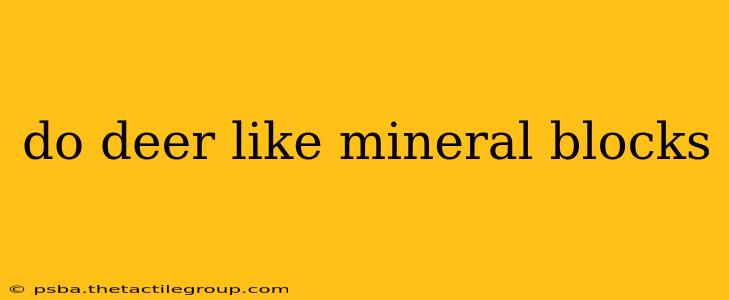Deer, like all animals, require a balanced diet to thrive. While they primarily feed on vegetation, access to essential minerals can significantly impact their health, reproduction rates, and overall well-being. This leads us to the central question: do deer like mineral blocks? The answer is a nuanced yes, but with important caveats.
Why Deer Need Minerals
Deer obtain most of their nutritional needs from plants, but these sources can be deficient in crucial minerals like phosphorus, calcium, magnesium, sodium, and zinc. These mineral deficiencies can manifest in various ways, including:
- Poor antler development: Antlers are largely composed of calcium and phosphorus. A lack of these minerals can result in smaller, weaker antlers in bucks.
- Reproductive issues: Mineral deficiencies can impact fertility in both does and bucks, leading to reduced breeding success and lower fawn survival rates.
- Weakened immune system: Minerals play a vital role in immune function. Deficiencies can leave deer more susceptible to diseases and parasites.
- Reduced overall health and vigor: A lack of essential minerals can lead to general weakness, poor coat condition, and reduced resistance to environmental stressors.
The Allure of Mineral Blocks
Mineral blocks offer a convenient and concentrated source of these essential minerals. Deer are attracted to the salt content, often a significant component of these blocks, and this salty taste encourages consumption. The ease of access also makes them appealing, especially in areas where natural mineral sources are scarce. Deer will readily lick mineral blocks, supplementing their diet with the necessary nutrients.
Types of Mineral Blocks and Deer Preferences
Not all mineral blocks are created equal. Formulations vary depending on the target animal and the specific mineral deficiencies in a given region. Some mineral blocks are designed specifically for deer, containing a balanced mix of minerals tailored to their nutritional needs. The preferences of deer can also vary based on their specific dietary deficiencies and the overall mineral availability in their environment.
When Mineral Blocks Aren't Enough
While mineral blocks can be a valuable supplemental feeding tool, they are not a replacement for a healthy and diverse natural diet. Providing a diverse range of forage through habitat management remains crucial for deer health. Over-reliance on mineral blocks alone can lead to imbalances in nutrient intake and neglect other essential dietary components.
Considerations for Using Mineral Blocks
- Placement: Strategically place mineral blocks in areas with good cover to provide deer with a sense of security while they feed.
- Accessibility: Ensure that the blocks are easily accessible to all deer in the area.
- Monitoring: Regularly monitor mineral block usage to determine if adjustments are needed to the formulation or placement.
- Predator Concerns: Be mindful of the potential for attracting predators to the area due to increased deer activity.
- Regulation: Check with local wildlife agencies for any regulations or guidelines regarding the use of mineral supplements for deer.
Conclusion: A Supportive Role, Not a Replacement
In summary, deer do indeed like mineral blocks, largely drawn to their salt content and the replenishment of essential minerals missing from their natural diets. However, it's crucial to remember that mineral blocks should be considered a supplemental feeding strategy, not a primary food source. A healthy and varied natural diet, coupled with strategically placed mineral blocks, offers the best approach to ensure the health and well-being of deer populations.

